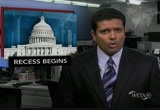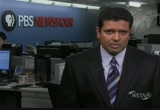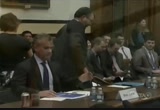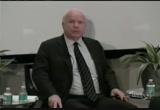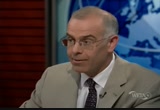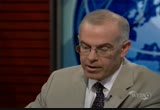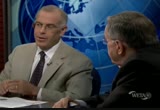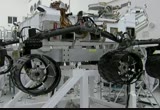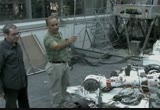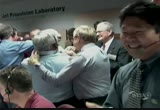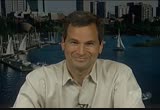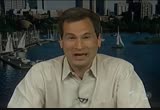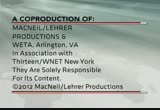tv PBS News Hour PBS August 3, 2012 7:07pm-8:00pm EDT
7:07 pm
growth being pretty weak in the last three, the prior three months to this employment report. >> brown: now lisa, at the same time, the rate inched up in spite of that hiring. explain that to us. >> well, it was interesting. we learned a little bit of math today. the unemployment rate was reported as going up from 8.2% to 8.3%. but when you actually dig into the numbers, the unemployment rate went from 8.22% to 8.25 percent. and then the bls just rounded it up to 8.3 percent so we had 3/100 of a percent increase in the unemployment rate that is essentially no change whatsoever in the unemployment rate and bls did say that. but people right now are very obsessed on small movements in numbers and is the number going up or is the number going down. so it doesn't really matter what is the math behind it. >> brown: due it doesn't go down even as those, you get a higher number of jobs.
7:08 pm
i think that's the confusing part. >> well, that's because we have two different surveys that are used to report information on what's happening in the labor market. we have a survey of employers, over 400,000 employers that the employment number is drawn from. that's a very large survey and does a reasonably good job at counting net changes in employment in the economy. so we have a smaller survey of about 60,000 households that's used to calculate the unemployment rate and look at some of the demographic characteristics of unemployment, unemployment by schooling, unemployment by ethnicity. and that report is a much smaller sample and there's much more variation in those numbers from month to month. >> brown: and enrico moretti, what do you see in today's numbers or in recent numbers as we talk about a glass half full or glass half empty, what's going on? >> the labor market is improving but too slowly.
7:09 pm
we need 150,000 new job each month just to absorb the young people in training the labor force sochlts's not surprising that today's numbers in terms of unemployment were not particularly good. the labor force participation rate which is the fraction of adults with a job is the lowest it has been in 20 years. the current pace is going to take 8 to 10 years to go back to where we used to be six years ago. so it is half full but also half empty. >> brown: so you praise both short and long term thinking here. i know when you talk about the geography of jobs, where the jobs are, you look long and short term. think short term for a little bit for us first. what does your work tell us about where the jobs are and where they're not. >> well, we think of the u.s. economy as one economy. but the reality is that there are 320 different economies.
7:10 pm
one for each metropolitan area in the country. and you see some of these areas are doing okay. for example north dakota, south dakota, parts of it are doing very with. unemployment rate is within 2 and 3% there. and that's not surprising. oil prices are high and oil production is high and therefore unemployment is high. more interestingly, you see cities like seattle, raleigh, austin and san francisco doing very well. and there the common denominator is high tech and innovation. this reflects a long running trend, increase in the economic conditions in cities that are able to attract high tech and innovation companies. >> brown: you can draw longer conclusions from these trends when you try to look out at the shape of the economy, the growth of the economy and jobs in particular? >> yes. on one end, states like the dakotas are lucky because
7:11 pm
oil prices are high today and there's no guarantee that we remain high but cities that are able to secure a stable and thriving innovation sector have much better long-term prospects. we're seeing over the past three decades a trend of growth in cities with a lot of high educated, highly productive and highly creative workers. and this is likely to continue. and possibly accelerate. >> lisa lynch, how do you, what do you see when you look geographically, especially when you try to fit it in. we're talk bag month by month. i know that only tells you some of. what do you see when you think about the country geographically? >> well, two things just to follow up on what enrico was sayingment first on this issue of innovation. we see enormous differences in terms of the unemployment rate experience by education. so people with a college degree have unemployment rate 46.1%. but if su have less than a high school degree you have
7:12 pm
a 12.7 percent unemployment rate so there's huge discrepancies by education. then when we look geographically say, for example tex state level which is a more aggregate level than what enrico is talking about. you go to a state like california or nevada where you have double-digit unemployment, and then when you add in the number of workers that have dropped out of the labor market because they're discouraged with finding a job but want a job or the number of people that are working part-time but want a full-time job, in both nevada and california you have one in five workers that is in that state. so even in a state, for example, like california that has very dynamic cities like san francisco, you have other cities that are not that far away, say stockton that are experiencing much higher unemployment. and it really comes down in large part to skill differences in the capacity of individuals to keep pace with this innovation. >> brown: and i assume, enrico moretti, that it can
7:13 pm
be hard for people to move in many cases, even nearby towns especially with the housing problems and other such things to keep them where they are. >> it is true. it's a paradox. the economic fortunes of american cities are diverging. and the difference between cities that droing well and cities that are struggling has never been larger. and yet mobility rates are very low today. and particularly low for low skill workers. workers with a high school degree or with worker who drop out from high school are the least mobile of all. and it is costing them tremendously in terms of earnings and higher unemployment rates. >> brown: interesting in the short term and thinking about the long term, enrico moretti and lisa lynch, thank you both very much. >> thank you. >> thank you, jeff. >> brown: and as always when the jobs numbers come out, "newshour" economics correspondent paul solman weighs in online with his own "solman scale of unemployment." you'll find paul's take on our "making sense" page.
7:14 pm
>> woodruff: still to come on the "newshour": a political firestorm over possible budget cuts; shields and brooks; mars or bust for the curiosity mission and the amazing tale of a phone, lost and found. but first, the other news of the day. here's hari sreenivasan. >> sreenivasan: congress began its five-week summer recess today with a long list of legislation yet to be completed. so far, republicans running the house and democrats controlling the senate have deadlocked over extending the bush-era tax cuts at year's end. there's also been no agreement on a new farm bill or interim drought relief or, on cyber- security legislation and a major postal service overhaul. the u.n. general assembly today condemned syria's government and demanded a political transition. the non-binding vote also criticized the security council for not failing to act against the syrian regime. meanwhile in syria, government tanks assaulted the last rebel stronghold in damascus. and mortar rounds killed at least 20 people at a palestinian refugee camp in the city. palestinian officials in the
7:15 pm
west bank voiced outrage. >> ( translated ): we ask all the different parties not to drag the palestinians into the ongoing fighting. i repeat the palestinian leadership position: to avoid anything that might be fueling the conflict, and to maintain the unity of syria. to keep it from any division or external interference, and also to keep the demands of the syrian people. >> sreenivasan: the fighting also escalated in and around aleppo. rebels battled to hold on to sections of the city and buildings like this hospital in a nearby suburb were left in ruins. damaged vehicles and debris littered the streets after days of heavy combat between the rebels and government forces. at the summer olympics in london, track and field got underway, as swimming neared its climax. spoiler alt:ve we ha some of the results now, so if you don't want to know just yet, tune out for a moment. the u.s. had another big day in the pool. american michael phelps won the 100 meter butterfly for his record 21st olympic medal, including 17 golds. missy franklin captured her third gold medal of the games, winning the 200 meter backstroke in world record time. and 15-year-old katie ledecky--
7:16 pm
the youngest member of the u.s. team-- won the women's 800 meter freestyle. for the first time, a saudi arabian woman competed at the olympics today, but it didn't last long. judo fighter wojdan shaherkani was defeated by a cuban opponent, after just 82 seconds. the 17-year-old saudi wore a tight-fitting black cap after olympic officials barred her from competing in a traditional headscarf. conservative islamic clerics in saudi arabia argued the teenager would dishonor herself by fighting in front of men. those are some of the day's major stories. now, back to judy. >> woodruff: there's a familiar ring to this next story: congress still has not agreed on how to balance the federal budget and there's a deadline approaching. margaret warner explains the latest skirmish. >> i want to also say a word or two about sequester. >> those who would be affected by the sequester. >> warner: "sequester"-- it's been the bipartisan buzzword of choice lately. the term refers to across-the- board budget cuts that take effect january 2, if lawmakers
7:17 pm
can't produce a deficit reduction package before then. this measure was part of the "budget control act" passed by both houses of congress and signed by president obama a year ago today. the sequestration ax would slice $54 billion from defense and an equal amount from domestic programs from head start to the border patrol next year with more to follow. though the troops themselves are exempt, the looming defense cuts have kicked up a political firestorm on full display wednesday at a house armed services committee hearing. the office of management and budget's acting director jeffrey zients sparred with republican congressman randy forbes of virginia. >> mr. zients, i'm just asking if you can tell me if there's any proposal you can put forward today, any proposal that the president has put forward to stop sequestration that has gotten a single vote in a senate committee, on the senate floor, >> the root cause problem here is the republicans refusal to
7:18 pm
ask the top 10% to pay their fair share... ( crosstalk ) i understand your partisanship. i'm just asking you if you can tell me if that proposal... ...defer their spending cuts... ( crosstalk ) >> ...can you point to such a proposal? >> there is... >> then your answer is no. >> reporter: the verbal spat came after a weeks-long republican campaign to sound the alarm to the public. arizona senator john mccain and other republicans have taken the message to states with lots of defense- related jobs. >> no uniformed military leader who we trust agrees that these cuts would do anything but devastate our national security. >> reporter: house armed services committee chairman buck mckeon took aim at president obama at a mitt romney presidential campaign event tuesday in arlington, virginia. >> has anybody here heard the word sequestration? let me change that. do you get sick and tired of hearing we need to cut more out of defense? >> reporter: and on the presidential campaign trail, president obama and his republican rival mitt romney have traded accusations about
7:19 pm
who's to blame. >> today we are just months away from an arbitrary, across-the- board budget reduction that would saddle the military with a trillion dollars in cuts, severely shrink our force structure, and impair our ability to meet and deter threats. don't bother trying to find a serious military rationale behind any of this, unless that if i am president of the united states, i will not allow that to happen. >> there are a number of republicans in congress who don't want you to know that most of them voted for these cuts. now they're trying to wriggle out of what they agreed to do. instead of making tough choices to reduce the deficit, they'd rather protect tax cuts for some of the wealthiest americans, even if it risks big cuts in our military. >> this is theatre. >> reporter: former top omb defense budget official gordon adams, now teaching at american university's school of international service, sees a lot of posturing at play. >> so this is a highly-staged
7:20 pm
and scripted drama where every player is playing his or her part, everybody is jumping up and down wringing garments, tearing hair, gnashing teeth and making it look like horrible things like armageddon are going to happen. the reality is i don't expect it to happen but even if it did it's a slow roll process when it does, but it's a great thing to fight about in an election year. >> reporter: some defense contractors, including lockheed martin, have tried to stoke the fight, by warning that under a federal 60-day notice law, they may have to issue conditional layoff alerts before the november 6 election. on monday, the department of labor issued guidance that layoff announcements were not required and unwise, while cutbacks were still speculative and unforeseeable. armed services chairman mckeon dismissed that guidance as politically motivated. >> now, in the department of they have no legal authority to do what they did.
7:21 pm
so if i'm a ceo of a company and i go to my attorneys for guidance, they would just laugh at that. because if they do layoff their employees and don't send the notice then they are liable to be sued. >> reporter: fears of immediate hits to defense production lines in january are overblown maintains. defense budget expert adams: >> they will not feel the effect on january 1, in fact, because defense contractors today are working on contracts that were funded by dollars appropriated three years ago, two years ago, last year, this year and they are working on those contracts today and none of those dollars are going to be affected by a decision to do across the board cuts on january second. >> reporter: yet deputy secretary of defense ashton carter made clear wednesday the administration is deeply worried about the impact. >> sequestration, therefore, if would introduce senseless chaos into the management of every single one of more than 2,500
7:22 pm
defense investment programs, inefficiency into the defense industry that supports us and would cause lasting disruptions even if it only extended for one year. >> reporter: and later, he told the newshour the dilemma faced by contractors is well-founded. >> each and every contractor who works for the department of defense has to take heed because remember, this is across the board, it is indiscriminate and so each and every, you named a bunch of aircraft, and investment programs, but it's true of every r & d program. every piece of our operations and maintenance. all of our personnel accounts. every single thing gets hit with this, so each and every one of >> reporter: so it's not a political gimmick? >> i've spoken to a number of our defense contractors. they take it as a serious matter. we have the same issue in the government, which is we are trying to balance being ready if this really terrible thing happens to us.
7:23 pm
and not causing some of it's bad effects before we even have a chance to solve it. >> reporter: as long as this remains a hot button campaign issue for both parties, no one expects a deal to solve it before the november election. >> woodruff: and now to the analysis of shields and brooks. that's syndicated columnist mark shields and "new york times" columnist david brooks. gentlemen, good to you have with us. >> so whether we use that strange word sequestration or whether we talk about automatic budget cut, david, with so much at stake, why couldn't they come to an agreement on this? >> well, remember, it's supposed to be terrible. the idea of sequestration, it's an enforcement mechanism. they said to themselves, we're going to force ourselves to cut a budget deal with each other. and if we don't do it, we'll hit ourselves in the face way hammer. and that will be soed ba, we'll do it. the problem is both, you don't do it and then you end up hitting yourself in the face way hammer.
7:24 pm
so that's the basic situation they're? the problem is with people who actually have to make policy. like you're sitting in the pentagon, you have to plan the next ten years. it may not hit you next month but you're trying to figure out what you are going to cut what are you not going to cut. you don't know with any remote idea how much money will have for the next ten years. so maw i have the dumbest possible cuts coming down the line, and therefore you just cannot plan. and so everyone in the policy world is in a panic over this sledgehammer. and i wouldn't expect them to solve this before the election. i wouldn't totally expect them to do it in the lame duck sessionment i figure it would all get wrapped up into some sort of huge deal for the next president. >> some kind of huge deal. at this point is one side or another getting the better end of this politically? >> i'm not sure judy. i think the republicans are trying to make the case which is a hard one to make. that sequestration is this terrible plot foisted upon them.
7:25 pm
70% of congressional republicans voted for it, including chairman mccain who was interviewed and spoke so scathingly against it, passing over the fact that he himself had voted for it, as did the leadership of his own party it wouldn't have passed with just democratic votes. there weren't enough democratic votes it was a tie among democrats in the house. so it is interesting to me, because the argument of republicans historically has been against government spending. the only government spending that creates jobs according to republican theology apparently is defense spending. all others is wasted. but this is serious. david is right. it's not just about defense. i mean immediately half the cuts come out of school lunches and head start. >> as marg ret was reporting. >> that's right. and domestic spending as well. >> it is true that the ghost of john maynard keynes has come down and landed in the republican caucus.
7:26 pm
suddenly they believe in stimulus spending. the point republicans make which i do think is accurate and endemic to the obama administration she are asking him to offer a plan. and some is just a gimic to get him on record in smorted of some cuts. but in general i do think it's true if you are a president you do have to lead. you do have to have budget plans. and if you remember a couple years ago when obama let paul ryne go first, that was politically cagey, not presidential. i think in this case the white house is to be faulted for not at least showing the road map so some people have a sense of what is going to happen. >> woodruff: so the president does bear some of the responsibility. >> in defense of the president, he's not blameless in this. but this sequestration came directly from the failure of grand bargain. and between him and speaker boehner last summer and that this was -- >> the united states lost its credit rating as you will recall as a consequence of this, or potential shut down and so the president was at that time according
7:27 pm
to best reporting or most reporting, ready to offer this grand bargain. the speaker was as well but found out that his own caucus, it would be a mutiny. this, david is right, this was to be the enforcing mechanism. you can see it is a serious enforcing meck civil because it has gotten their attention. >> you were also saying earlier today this highlights a division among some repubcans that defense hawks versus so-called tea party hawks. how much of a fact certificate that. >> it really opened newspaper the last year or two, you have the defense hawks who really think this would devastate or think cut was devastate our national security and they're lead by monday jean chretien main and lindsay graham and the more tea party oriented people who are just not that-- they're not against defense spending but it's not a priority, lowering taxes and economic domestic economy is a priority for them and they are happy to see the defense budget decrease. not all of them. not mark o rubio but a lot
7:28 pm
of them. so are you seeing a rift between the defense, the defense cut hawks and tax cut hawks, if you look at the baffle the republican party they are on the tax cut hawks. support for high defense spending is probably decreasing in the republican party. >> woodruff: which is interesting. the timing of ted cruz, the tea party candidate and the republican primary in texas won, defeated the more establishment republican. so if we're going talk about the tea party for a minute, how big a deal is that w what does it is a about the republican party? >> david has identified one of the few chiefages in the republican party in congress right now. the republican party has become a far more homogenous, far more idea logically similar, identical party. the victories in these rhymearies, primary after primary where a republican in david duherst in not dick luggar by any means in indiana where compromise or
7:29 pm
working on the other side is somehow considered to be disqualification. i mean ted cruz say smart, well educated, thoughtful, intelligent man. but he brings to politics a belief and a conviction that compromise is not a alternative course. it's not a legitimate activity. and i think, judy, one want look at this race in texas without looking at steve's retirement in ohio. steve latourette, republican congressman, nine terms, a player on the health, respected on both sides of the aisle, a republican, close to speaker boehner. but because he strayed occasionally from the orthodoxy of his party, because he didn't raise enough money for the party coffers, he was going to be denied a leadership position and finally said, and he said in his farewell remarks, compromise what become a dirty word among my party.
7:30 pm
>> woodruff: how do you see all that? we don't know whether ted cruz is going to win. it is expected he will win in november. >> right. >> so i would say mark used the word conviction and that's the right word here this is a guy at age 13 was going to seminars and learning about hyack and-- went to prince toon, studied with robert george, a serious conservative intellectual. he goes to harvard law, then for justice rehnquist, he has come up through the ranks of the conservative intellectual machine f you want to put it that way. he has a very madisonian vision that the government has really, the u.s. has really strayed off from this madisonian vision and he and people who think like him aring are really going bring it back and are firmly convinced of that. it is not that they will necessarily vote that different from every republican but the conviction is frmer, the ideology, or philosophy is firmer and the idea of compromise is probably a little more -- >> what does that mean for washington in the next year. >> it means if the
7:31 pm
republicans do win the senate as republicans are hopeful they will, that mitch mcconnell, the republican leader is going to have more than his hands full. because these are folks that really, aren't going to primes in the majority any more than they were willing to in the minority. the majority has a responsibility to try and pass legislation and keep the government open. i think it doesn't go well for any sense of consensus and coalition in this city. >> the only thing i would say, these people are not stupid. they know you have to have an enactment strategy. they know they are not going to be 60 house rope can senators so they will need democrats if they are going to get something done. at some point we have to say how will we maneuver this to get something done. it's hard to see now but the alternative is just never passing the stuff they want to pass. and so at stock point if you want to get something done, dow have to compromise.
7:32 pm
>> the reason i said steve latourette he is walked away. republicans are are or anybody else who say things, a renomination fight in his own party, all is in his ears in mike cass nell delaware went down to christine o'donnell, a bizarre candidate, bob bennett in utah. dick lugar in indiana, i mean after, race after race this has been the case, judy, where the more extreme, the more pure, the more idealogically driven, the less compromising candidate loses. >> i had a meeting with one of the most conservative people in the united states senate and he was terrified of being primaried from the right. and if this guy val conservative but if he is primaried, they are all terrified of it. and it is having a powerful influence. >> woodruff: we must talk about the unemployment report that came out today, david, the 163,000 new jobs but the rate went up a little bit as we were
7:33 pm
hearing. impact of this, on the campaign, on the country. >> i think-- first the substantive impact on the country. i'm really struck there were 400,000 people on the labor force, mail labor force is plummeting, this is a deep national problem, substantively. politically what we are seeing is this odd bifurcation. in most of the country, in about 40 states. people are not seeing a lot of ads, just looking at the national news. looking at the economic numbers and romney is doing pretty well, especially in the red states numbers are going up, up, up. in the swing states where they are seeing a lot of ads, would you have to say in the past couple week os bama is winning, there has been an uptick in support for them and so the adds seem to be trumping the national economic new business is not so great. and so you have to say that there have been reasonably good weeks for obama trying to win the electoral college. >> when you talk about ads are you talking about obama. >> obama running the bain
7:34 pm
add o ads. >> which at the moment politically in those states seems to be trumping the poor economic news. >> woodruff: but this month of july report, mark, how much of a dent one way or another. >> well, it's better news than it was. any time you hear better than expect. 163,000 jobs or 100,000 are expected, not you what hope, not that is going to drive down the unemployment rate, 29 consecutive months of private sector growth in the economy. the loss again is in the public sector. we're still laying off teachers and firefighters and police officers and public workers. but you know, judy t gave the market a lift today. and that sense. but what we're looking at is not a turn around between now and election. and i am just wondering if maybe the electorate voters have already baked in these figures. i mean this is a race that is tied. we've had nothing, the best economic news we have had in
7:35 pm
the job since february. we have had really bad economic news and yet the race remains tied so you just wojd ferr they haven't maybe processed that in. >> and they're just not hearing it. >> i mean they discounted or they have figured that in already in their decision this is a race that is rather remarkable how constant it has been even with all that has happened. >> last thing, postscript. any final word on the romney trip overseas. he came back earlier this week, does it change anything. >> i think i liked mostly what he said about culture in israel. most of the things i cover that have gone bad is politicians don't understand the importance of culture. when are you talking about europe, iraq,ed u.s., it was completely misapplied to the palestinians but to at least think about things other than economics to think about the importance of culture. i'm not going to slap him for that. >> i will slap him for israel. i thought it was shameless
7:36 pm
to go in there and basically to turn his back on by part san american policy, both parties, presidents on the settlements, on two-state solution, in jerusalem and the capitol. and then just to basically use it as a backdrop for 50,000 fund racer where he honored shelton ed elson the man who funded 8978% of newt gingrich's pact to-- pac to attack mitt romney it me it looked like sleazy politics. >> woodruff: the two of will you never be a backdrop for us. mark shields and david brooks, thank you both. >> brown: next: a mission to mars filled with high-stakes challenges. among them: nasa's new rover will have to successfully execute a very complicated landing procedure early monday morning or else. "newshour" science correspondent miles o'brien previews what's ahead.
7:37 pm
>> and lift off of the atlas 5. >> they are the most accomplished and intrepid explorers of mars yet as they home in on the red planet with their biggest, most complex, most expensive mission ever, they are running themselves through brutally tricky simulations. >> the approach 2,000. criteria are active, rt update rate. >> and lossing a lot of sleep. >> so i have this terrible experience where i will awaken and go down the list of all the things that i could worry about. it's a very long list. >> reporter: for engineer adam steltzer and other mars mavens at nasa jet propulsion laboratory in pass dena, california t is a 2.5 billion all-in bet on a safe arrival on mars. >> it is the result of reasoned engineering. >> the entry, descent and landing is known as 7 minutes of terror. and a nasa video describing the tense sequence has gone viral on the web.
7:38 pm
>> so when we first get word that we have cut off the atmosphere, the vehicle i is-- gold medal or smoking krart, not much in between. >> there's an awful lot riding on it and i think the team thinks that they've done everything that we can. i know i believe that we've gone everything that we can. and at that point it's in sort of the hands of fate. >> the mars science laboratory named curiosity by a contest winning sixth grade certificate a curious craft, indeed it is designed to see if mars was ever a habitable place. >> so what we've got here is the model of curiosity that we will use for the entire mission. and whenever we want to do something new on mar wes do it here first in the test bit. >> right. >> the project scientist gave me the new rover
7:39 pm
salesman spiel on a carbon copy curiosity used to practice, test and troubleshoot. weighing a ton, powered by plutonium, curiosity is the size of a small car, muche bigger and much mover capable than its plucky predecessors, golf cart size spirit and opportunity which arrived on mars in 2004 and found tons of evidence the planet was once warm and wet. >> that's the calibration target for the instrument, the laser. >> where is the laser, by the way. >> you can't see it, it is facing down on the deck of the rover. >> curious lit take the scientific absoluting for life past or present to a whole new level with an unprecedent add rea of experimental capability. >> we have 17 cameras. so we're going to be getting alot of pictures an that's a lot of data volume to kbooj. >> there are 10 scientific instruments on board the mars science lab. the rover is designed to sample rocks as far as seven meters or 23 feet away.
7:40 pm
a laser will aim to create a small cloud of plasma that can be analyzed by a spec trom ferr. curious lit drive over to the most interesting rocks and get to work. >> in front of the rover is the arm. and the arm works just like ours. so what this does is gives us the same five degrees of treatment. goes like this up, up and down like this then the elbow can come out and then we have a wrist that ro fates around so it works exactly how our arm works. >> an on board drill is designed to grind and jackhammer out samples that curiosity will then study with a suite the spectrometers, even an onboard oven designed to bake gases out of the rock and soil that could be telltale signs of organic compounds, the building blocks of life. think of it as a roving, robotic gee om trust and chemist. >> the he economy-- equipment that you would have would normally fill a room of this size.
7:41 pm
>> capable and compact as curiosity is, scientists here are quick to say it is not a life question tecter. >> it's not like we're blind to detecting life. want to make that clear. but that's not purpose of the mission and not how we designed the scientific experiments to work. >> the deputy project scientist for the mars science lab reminded us, if there was life on mars it was likely 3 billion years ago and microscopic. even finding evidence of life that small and that old on earth can be a huge challenge. >> you can get tricked by natural processes that mimic biological processes and we learned that the hard way. >> nasa viking landers that arrived on the red plan at the time in 1976 did swing for the scientific fences but struck out, find nothing smoking gun proof 6 martial life past or present. curious sit headed to a much more scien difficult chrooi interesting place than the viking sites.
7:42 pm
gail crater created by an asteroid impact sits in the shadow of an 18 mile high mountain. lay upon layer of sediment offers a history book for curiosity reading pleasure. the chief engineer. >> we why, we're land teg part of the book tlarx is the first page, the earliest part, as we go higher and higher up the edge of this mountain, we'll be able to look more recent in time. and so we will sample through the layers of time and see how the environment, the environment, the atmosphere, the water conditions, just overall chemical conditions were possible for life. >> but first they have to arrive-- arrive alive and that is no small task. curious sit too big and heavy to bounce on to the surface as spirit and opportunity did. the air bag material is just not strong enough. >> so the wizards here devised and tested an
7:43 pm
audacious entry, descent and landing scheme that is part transformer, part ruth goldberg. >> how many things have to go right? >> a tremendous number. we have 79 different pyro devices that have to go correctly. that all have to function. >> all 79 have to fire. >> all 79 have to fire. if one of them doesn't, game over. >> if all goes as planned, the kraft will ent-- the craft will enter the at position fear at more than 14,000 miles an hour. thrusters will fire to slow it down and guide it towards the bull's-eye. a supersonic para chuted deploirxed heat shield separates and drops away. a landing radar will measure altitude and speed. the back shell separates and then eight rocket engines start firing. then a sky crane will lower the rover softly to the ground protecting it from rocket tlufers and debris. >> we think it's dandy. it looks crazy. we get that t look twhas to
7:44 pm
us at times but we really think the world of that landing system. it solves every problem that we've ever had with previous landing systems. >> it will be a thrill of victory or agony of defeat moment. the overall success rate for missions to mars is only about one in three. here 59 jpl they've gone 13 for 18. that's a 7: -- .720 batting average in the red planet league. even so this time the nerves are racheted higher along with the stakes. >> facing budget pressure from the white house, nasa has reduced funding for mars missions and pulled out of plans to partner with the european space agency to stage an elaborate series of missions to mars to bring a rock sample back to earth. much to the dismay of the mars science community. jim bell is president of the planetary society and also
7:45 pm
on the spirit opportunity and curiosity imaging teams. >> it's frustrating to try and understand why the administration or congress would want to stop what so many americans are incredibly proud of and has been so successful. >> one of their big apply loos is democratic congressman adam shift who represents the california district that is home to the jet propulsion lab. >> if we step back from mars now at a time when we are tantalizingly close to finding the building blocks of life on mars, it may be decades before we go back. >> facing the bleak funding outlook, nasa has gone back to the mars drawing board. john grunsfeld is the associate administration for science. >> we're redesigning the mars program as we did in the early 2,000 that lead to spirit, opportunity and mars science laboratory. so i think we are still on the path to mars sample return but we have to do it on a pace and with the right series of missions that are
7:46 pm
affordable within our budget. >> easier said than done. nasa is currently caught between a mars rock and a hard place. unable to sustain a space station, develop a new giant rocket and keep the big complicated robotic missions flying. here at the nexus of nasa robotic exploration endeavor, the fear is a smoking crater means the end of a grand, glorious adventure. >> that the end of going to the mars? is that what the thinking is? >> that's the worry. we have put a lot of investment into this. a lot of science, development, a lot of engineering development. >> yeah. >> and if it doesn't go well, we've got to ask ourselves are we ready, are we brave enough to keep going to, keep trying. >> but if it does go well and curiosity finds a tantalizing clue to the ultimate cosmic puzzle, there is hope here the funding had will flow again, just as water once did on mars. so even if the 7 minutes of terror pan out with the healthy mars rover, the team
7:47 pm
here still has another steep mountain to climb. >> reporter: now we mention that the landing happens early monday. we do mean early. word of whether curiosity landed successfully is expected to reach earth around 1:30 a.m. eastern time. if are you still up or getting up, we'll be up too, some of us, anyway, covering it all on-line. >> woodruff: finally tonight, a story about how the web, its users and tracking technology helped recover, yes, a missing smart phone. it sounds like a story right up hari sreenivasan's alley. hari. >> sreenivasan: when most people lose a cellphone, there's not necessarily an online community of strangers to help track it down. but "new york times" technology columnist david pogue has quite a few twitter followers: 1.4 million of them. so when pogue lost his iphone on a train this week, believing it was stolen, he posted this tweet
7:48 pm
yesterday to ask for help finding it. there was quite a response. pogue posted to twitter a map of where the phone signaled it was, within minutes a large online crowd started to stalk his phone, all based on an app that was tracking its location. hours later, police in prince george's county maryland, tweeted back, saying they had found it. there's a lot that happened in between-- much of it good news-- but also some real questions about privacy in the digital age. david pogue is here to help lay that out. he's also the new host of "nova science now" and he joins us from boston. >> my pleasure. >> so how did it happen? you said to the world, here, guys, look for my phone or i think it's stonl. what happened in between? >> well, the great thing was that i lost the phone on monday when i was on this train. and apple has a feature called find my iphone. you go to this web site and it shows you on a map either like a street map or satellite photograph of where the thing is right
7:49 pm
now. and it's available for other phones too, android phones and so on. and it's the greatest feature if you ever lose your phone. but whoever had the phone had turned it off and you can't t doesn't work when the phone is off so for three days i was in missery thinking oh my gosh this shuns of dollars in replacement fees and then thursday morning, i got an e-mail from find my iphone that says your phone has surfaced. here it is in a suburb of maryland. so there i was, you know in connecticut where i live and unable to go to maryland. so i said what do i have to luchlts i went on twitter and said my phone has shown up. can anyone help me. i thought you know, maybe someone would say hey, i live next door or oh, i work near there. that is pretty much what happened except that people said i'm not going over there t is kind of a sketchy neighborhood so i also called the police in the local area and my twitter followers also figured out the police department there and suddenly the police were like what is this?
7:50 pm
and one of the guys who heard about this was a local policeman off duty but a fan and a twittish follower. and he contacted one of the blogs that was following this and said you know what, why don't i drop by and have a look. >> and so there it was. it was apparently in somebody's backyard and you sent a little signal so that the phone would make a sound. >> so one of the great features of this find my iphone thing is that if you misplace it somewhere in your house perhaps from another phone or from your computer you can send a pin message that makes it make a really loud noise nor two minutes. it goes binge binge binge, binge binge binge, for two minutes and you can also put a message on the screen as i did many times like you have my moan. i'll give you $100 if you can call me, and so on. nobody ever responded to that but the police then went through the house that was indicated on the map, with me on the cell phone, saying okay, start pinging
7:51 pm
now, i'm listening, it was crazy it was like some kind of nasa, fbi, satellite spy operation because he was looking in maryland in the house where it was on the map but he couldn't hear the pinging. he said for half an hour he looked and he never heard the pinging even though i was frantically pinging the phone so we all gave up and then half an hour later he called me up. he said guess what, we found it in the backyard in the grass. >> uh-huh. >> that's where they naturally go from amtrak trains. >> well, it turns out that the home owner who said i don't know anything about it, did, in fact, know something about it. so the person had been on the train and had taken my phone. and the policeman asked me dow want to file charges, it's paperwork, it's delay, you might not get the phone back. it would be easier if i just say to him turn over the phone and we won't press scharings so that is what happened. he said okay, it's in the backyard.
7:52 pm
and the phone is now sitting at my house in connecticut waiting for me to come home. >> okay that all said s there not a little bit of a creep factor here. the fact that's great that you were able to find your phone but technically a cell phone provider has access to that data, perhaps somebody with a subpoena that goesed to cell phone provider has access to that data. >> i don't think there is a creep factor. because number one find my iphone is optional. i have to turn it on in several places, you know, on my phone and on-line. in the settings. so it is only there if you really want it there. second of all nobody can use find my iphone without your found my iphone password that you made up so it is exclusively for the use of the owner of the phone like me. so the only situation that some somebody's privacy would be invaded is if they are a thief and they took your phone, like this guy. so i'm not so worried about his privacy. he stole the phone. >> okay. and what about the idea that
7:53 pm
perhaps there are other apps that are not as forward with your-- i should say not as honest with your information and perhaps put location sensing into their technology. >> well, sure, but i have to say that is what you are worried about, then you have much bigger worries. verize on could be listening to every phone call you make. your grocery store could be looking over your purchases right now, visa could be laughing their heads off at what you bought there month there could be conspiracy and privacy invasions all around us. so yes, if you believe that somebody is secretly putting spians on your phone and monitoring where you go, that ship has left a long time ago. the cell phone companies do know where are you at all times. they have try angulation at any time. so if you don't want cell phones not to have the potential of knowing where you are, don't own a cell phone. >> "new york times" technology columnist david pogue, thank soches for
7:54 pm
joining us. >> my pleasure. thank you. >> brown: again, the major developments of the day: the u.s. economy added 163,000 new jobs in july, marking a five-month high. but the unemployment rate went up as well, to 8.3%. the u.n. general assembly condemned syria's government and demanded a political transition. and u.s. swimmers turned in another big day at the london olympics with three more gold medals. online, economist laurence kotlikoff continues to answer your questions about social security. today we have 11 common mistakes to avoid. gwen ifill reflects on a segment we did about economic segregation, and the greater implications of social isolation for america. and on art beat, ray suarez talks to marcus samuelson, celebrity chef, restaurateur and best-selling author of a new memoir, "yes, chef." tonight on "need to know" on pbs, the grand plan of chicago mayor rahm emanuel seeks to rebuild the city's aging infrastructure without raising
7:55 pm
taxes. we have a link. all that and more is on our web site: newshour.pbs.org. and that's the "newshour" for tonight. on monday, we'll look at unfinished business congress left before its summer recess, from cyber-security to help for drought. we'll begin a multi-part look. i'm judy woodruff. >> brown: and i'm jeffrey brown. "washington week" can be seen later this evening on most pbs stations. we'll see you online and again here monday evening. have a nice weekend. thank you and good night. major funding for the pbs newshour has been provided by: and with the ongoing support of these institutions and foundations. and...
7:56 pm
this program was made possible by the corporation for public broadcasting. and by contributions to your pbs station from viewers like you. thank you. captioning sponsored by macneil/lehrer productions captioned by media access group at wgbh access.wgbh.org vo:geico, committed to providing service to
7:59 pm
130 Views
IN COLLECTIONS
WETA (PBS) Television Archive
Television Archive  Television Archive News Search Service
Television Archive News Search Service 
Uploaded by TV Archive on

 Live Music Archive
Live Music Archive Librivox Free Audio
Librivox Free Audio Metropolitan Museum
Metropolitan Museum Cleveland Museum of Art
Cleveland Museum of Art Internet Arcade
Internet Arcade Console Living Room
Console Living Room Books to Borrow
Books to Borrow Open Library
Open Library TV News
TV News Understanding 9/11
Understanding 9/11






